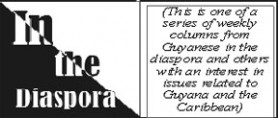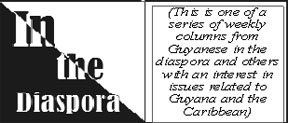By Cary Fraser
Cary Fraser is a regular contributor to the Trinidad and Tobago Review and writes on international relations in the Middle East, American foreign policy, and Caribbean history. He teaches at the Pennsylvania State University.
The Minister of Finance, Dr. Ashni Singh, has recently vented his spleen at the Economist Intelligence Unit for publishing a report that challenges the Guyana Government’s economic growth assessment in 2009. Dr. Singh also launched a silly attack on the World Bank and its local representative in Georgetown about the Amaila Falls project and the new office space acquired by the agency. In addition, President Bharrat Jagdeo and Minister of Agriculture, Robert Persaud, publicly lamented the pace at which funds have been released in support of Guyana’s forest protection regime. Given the report from the Observer newspaper in London which raised questions about the World Bank programme supporting forest protection regimes around the world and the possibility of abuses and corruption in the programme – with Guyana mentioned specifically as one of the countries targeted for such funds – it would seem that there is much more in these matters than the proverbial pestle in the mortar.
 While Dr. Singh’s remarks about the World Bank Office were less than flattering about his approach to matters under his purview, his criticisms indicate the strain under which the current administration is operating as the timetable for a national election begins to exert pressures upon both the PPP as a political party and its desire remain in power beyond 2011. It has been evident for some time that the PPP has a huge credibility gap in dealing with the international agencies that monitor Guyana’s economic performance and the current administration’s approach to governance. With President Jagdeo scheduled to step down in 2011, it is unclear whether the party can remain unified around any possible successor for leadership of the party and a viable candidate for the Presidency.
While Dr. Singh’s remarks about the World Bank Office were less than flattering about his approach to matters under his purview, his criticisms indicate the strain under which the current administration is operating as the timetable for a national election begins to exert pressures upon both the PPP as a political party and its desire remain in power beyond 2011. It has been evident for some time that the PPP has a huge credibility gap in dealing with the international agencies that monitor Guyana’s economic performance and the current administration’s approach to governance. With President Jagdeo scheduled to step down in 2011, it is unclear whether the party can remain unified around any possible successor for leadership of the party and a viable candidate for the Presidency.
The challenge currently confronting the PPP is to decide the future of the party’s leadership and a diminished role for Bharrat Jagdeo at a time that the current President appears uncertain about his own future – personal and political. It has been obvious for several years that he has been able to use the Presidency to keep the party leadership at a distance when necessary, and to play the various factions against each other. His success has created a style of leadership that is in keeping with the practices of the Jagans over the course of the party’s history, but Jagdeo is not Jagan and he lacks the charisma that had secured Cheddi Jagan his longevity of leadership. In public settings, Jagan was very careful to project an image of willingness to engage people at all levels of the society – often in language which made them feel comfortable and without any trace of condescension. President Jagdeo, and now Dr. Ashni Singh, have demonstrated that they have apparently not inherited those qualities from Dr. Jagan. The projection of arrogance and a disdain for accountability have become marked features of the current PPP administration and these are developments that promise a rocky road ahead for the PPP, in 2011 and beyond.
The recent remarks reported by the Stabroek News by the former British High Commissioner, Fraser Wheeler, on the eve of his departure – when juxtaposed against the comments from Dr. Singh and President Jagdeo – suggest that the British Government and its partners, Canada and the United States, have identified key issues that need to be addressed by any government that emerges from the 2011 elections. According to Wheeler, the original plan for comprehensive reform of the security sector, for which the British government was prepared to provide support, has been sidelined in favour of police modernization by the current administration. As a result, the British government had withdrawn its support after this shift in emphasis by the Jagdeo administration. Nonetheless, he held the door open for a resumption of support of security reform as “it involves increased accountability, transparency and increased inclusiveness.” Wheeler also indicated that the British government would continue to support an independent probe of the “phantom squad” and its activities as “this is a legitimate question which the government needs to address.”
The High Commissioner’s comments were remarkably frank for a diplomat and may be at the source of the anxieties that have been displayed by the Finance Minister and the President in recent days. The calls for accountability by donor governments – in both matters of governance and the use of external funds – are likely to increase, and the current administration has to explain itself and its policies to both the Guyanese public and its external partners as the election looms . Accountability, transparency, and inclusiveness are among the benchmarks for governance that the international donor community will use as guidelines in supporting any alternative to the legacy of failed governance that has defined Guyana since 1966. The Jagdeo administration is obviously unhappy with this shift in priorities and in tone by the international donors. It is not a comfortable place to be located after 18 years of being in office and with little to show beyond debt forgiveness as an index of economic performance.
These challenges to the current, and any future, administration in Guyana are occurring in a regional and hemispheric context where organized criminal networks – in collaboration and in competition with each other – are increasingly a threat to existing states and economic stability across the Americas. The insidious consequences of the drug trade for Caribbean and circum-Caribbean countries, including Guyana, have increasingly come to the fore as attested to by thee recent bloody events in Kingston, Jamaica. Tivoli Gardens demonstrated that the drug trade has the capacity to create a state within a state in the region, and the complicity of political elites in this development.
In Guyana, the Roger Khan episode illustrated a similar development. It is not without significance for Guyana’s relationship to the donor community that it was the American government that ultimately disposed of Khan — by way of criminal prosecution and incarceration. The Guyana government simply lacked the will to address the problem. At least, in the case of Jamaica, the state has reasserted its authority at the expense of both major parties and the “dons” whose image as modern Robin Hoods emerged after the fratricidal ideological and ‘turf’ wars that gripped Jamaican politics from the mid-1970s onward. The extradition of Christopher ‘Dudus’ Coke to the United States has opened the way for international collaboration to deal with these criminal networks in the region. Further, the reassertion of state authority will impose a requirement for effective governance to overcome the integration of criminal networks into the political process as a precondition for governmental stability.
It is important to recognize that the rise of criminal networks in Jamaica and Guyana since the 1970s has accompanied steady migration of people with tertiary level education and with business acumen. The loss of human capital has eroded the capacity of the state and the “official” economy to generate significant economic growth and transformation that could keep pace with population increase and the resultant demand for jobs and services. As a consequence, criminal networks helped to create an underground economy that filled the gap created by economic decay and poor public policy. In Jamaica in the 1970s, the export of marijuana to the United States and the importation of guns into Jamaica became one lucrative avenue for these criminal networks. In the case of Guyana, contraband trade with Suriname, Brazil, and Venezuela – financed in part by undeclared gold mined in Guyana – was an effective escape from economic and political crises in the 1970s and 1980s. In recent decades, cocaine has apparently emerged as the new coin of the realm in the underground economy in Jamaica and Guyana, a shift with disastrous consequences for these societies. .
In the wake of the Tivoli Gardens episode, Guyana needs to begin a process of reconstituting a politics of effective governance. The 2011 election campaign should be seen as a forum for debates about the future of the society, and about the institutional framework to implement governance arrangements which guarantee transparency, accountability, inclusiveness, and a more effective representation of civil society and its constituent groups in policy debates and implementation. Guyana needs a breather from the politics of racial polarization and social fragmentation that has defined its history since 1960. Neither the PNC nor the PPP has been a model of effective governance for Guyana. The wider society needs to debate those failures as a way of escaping the trap of settling for some version of ethnic supremacist politics. As is now clear, only financial and political bankruptcy can result from such governance practices.
President Jagdeo and Ministers Persaud and Singh should reflect on the fact that their recent comments and critiques of external agencies and actors reveal how little they recognize that the PPP has become a victim of its own decisions over the past 18 years. Cassius’ reflection in Shakespeare’s Julius Caesar seems apropos:
“Men at some time are masters of their fates:
The fault, dear Brutus, is not in our stars,
but in ourselves, that we are underlings”. – (Act I, Scene II).

